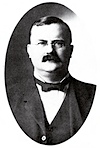I’ve been loathe, aside from the quick links, to comment on Barack Obama – the man, his election, his policies and picks. After all, he’s not even president yet.
Like most people I cannot but be impressed by his charisma and talent, but overall I never really bought in to Obamania and he was not my favorite Democrat in the primaries (I fully recognize I was wrong in my choice of John Edwards, though, since his sex scandal would have lost him the race had he been the Democratic candidate). My basic position on Obama’s Middle East policy during the elections was that he would deliver little different, even if one could hope that he would pick different people to work on it than the ones we’ve had for two decades, and that on the Israel question specifically not only did he fail to distinguish himself (aside perhaps from his speech to Jewish-American in Columbus, OH) but bent over backwards to reassure the lobby, all the while neglecting to highlight its responsibility in the warmongering of the last eight years. (I also found his lack of strong reaction to the economic crisis during the election quite shocking, which is my other major beef with him.)
So basically, I already am skeptical that we will see a fundamentally different US Middle East foreign policy than the Clinton and Bush years, which were not that different apart from Bush’s hyper-militarism (before we had more discreet militarism). I was unhappy about Hillary Clinton being picked as SecState, because I associate the Clintons as one of the worst developments in American politics in the past quarter-century, and did not see the political necessity of appointing his ex-rival rather than a more dour and wonky choice. But I don’t really care that much, think that all of the vapid editorializing about the Arab world expecting change from Obama is complete bullshit driven by a US news framing agenda rather than any Arab reality, and am sadly resigned to yet another administration that will miss the point about the centrality of the Israel-Palestine issue in this region (which every elder American statesman has made for years) and the extremely pernicious impact it has had on the US foreign-policymaking process. I just hope Obama can/will/wants to do good on other issues, such as the environment or healthcare – although I remain fundamentally convinced he’s miss one of the most important issues of our time.
Even so,I was surprised to read this albeit speculative article in Haaretz/a about the Obama-Clinton Middle East strategy:
However, senior government sources in Jerusalem said that the information they have received indicates that the new administration is planning a hierarchy of about five special envoys to various regions, overseen by a kind of “super coordinator,” who would answer directly to the president and the secretary of state.
The sources said that the new policy is part of Obama’s and Clinton’s understanding that all the conflicts in the Middle East and Southeast Asia are to some extent connected to the Iranian nuclear program and withdrawal from Iraq. Therefore, it is important to operate in a number of parallel but coordinated channels to attain achievements on all fronts.
The most prominent name in consideration for the top coordinator post is Dennis Ross, who served as President Bill Clinton’s special envoy to the Middle East. Ross’ name has also come up as a possible senior adviser to Hillary Clinton.
The envoy to the Middle East would oversee the peace process between Israel and the Palestinians, negotiations between Syria and Israel and the situation in Lebanon.
Short-listed for this job are Colin Powell, who was President George W. Bush’s secretary of state during his first term; Dan Kurtzer, U.S. ambassador to Israel from 2001 to 2005; and Martin Indyk, who is close to Hillary Clinton and who served as U.S. ambassador to Israel from 1995 to 1997 and from 2000 to 2001.
All conflicts in the Middle East are connected to Iraq and Iran?!!?! If they see it that way, it’s because they’ve decided the priority will be Iraq and Iran, which is to say it’ll be Iran. Fair enough, the Israeli-Palestinian process does appear at a deadlock with inter-Palestinian rivalry and the prospect of a new Netanyahu administration in Tel Aviv. Nonetheless, considering the humanitarian disaster in Gaza, continued ethnic cleansing and settlement expansion in Jerusalem and the West Bank, one would think the US could have other priorities on its mind (indeed, since a good part of the US defense establishment thinks it can live with a nuclear Iran, one wonders whether this isn’t an Israeli priority).
It’s also extremely depressing to see the list of names for top coordinator (Dennis Ross – nuff said) and for Middle East Envoy: Martin Indyk is AIPAC’s man and Colin Powell was a failure as SecState and obviously overwhelmed by his bureaucratic opponents. Even with Dan Kurtzer, the most palatable and professional of these choices, we have the slight problem that his brother is an Israeli settler.
Now one might put this down to the idea that these are the only acceptable names to Israel, which largely calls the shots with regards to US peace process policy, at least since the first Clinton administration. But it also shows a staggering lack of imagination: in all of the talent pool of Washington, DC, these are the only men one can think of for the job? Where’s the change we can believe in, Mr Obama?



